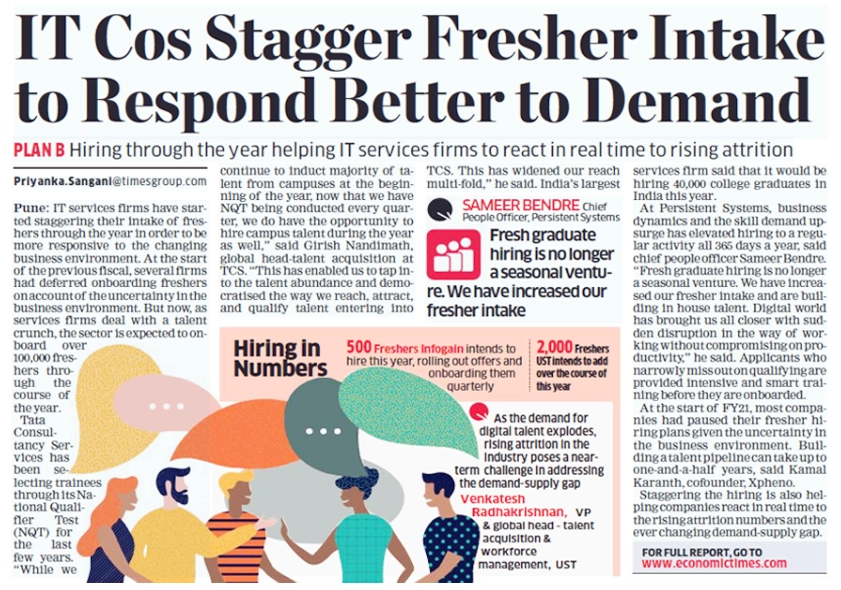- Posted on : September 3, 2021
-
- Industry : Corporate
- Service : Corporate
- Type: News

The following industry article published in ET Prime features our President and CEO, Ayan Mukerji. Follow this link to view the original article.
Indian IT companies have started staggering their intake of freshers through the year in order to be more responsive to the changing business environment.
At the start of the previous fiscal, several firms had deferred onboarding freshers on account of the uncertainty in the business environment. But now, as they deal with a talent crunch, the sector is expected to onboard over 100,000 freshers through the course of the year.
Tata Consultancy Services (TCS) has been selecting trainees through its National Qualifier Test (NQT) for the last few years. “While we continue to induct the majority of talent from campuses at the beginning of the year, now that we have NQT being conducted every quarter, we do have the opportunity to hire campus talent during the year as well,” said Girish Nandimath, global head of talent acquisition at TCS. “This has enabled us to tap into the talent abundance and democratised the way we reach, attract, and qualify talent entering into TCS. This has widened our reach multi-fold,” he said. India’s largest services firm recently crossed the 500,000-employees mark and said that it would be hiring 40,000 college graduates in India this year. At Pune-based Persistent Systems, business dynamics and the skill demand upsurge has elevated hiring to a regular activity all 365 days a year, Chief People Officer Sameer Bendre said.
“Fresh graduate hiring is no longer a seasonal venture. We have increased our fresher intake and are building in house talent. Digital world has brought us all closer with sudden disruption in the way of working without compromising on productivity,” he said. Applicants who narrowly miss out on qualifying are provided intensive and smart training before they are onboarded. At the start of FY21, most companies had paused their fresher hiring plans given the uncertainty in the business environment.
Building a talent pipeline can take up to one-and-a-half years, said Kamal Karanth, cofounder at Xpheno, a staffing solutions company. Another reason for the staggered hiring, he said, is the difficulty in effectively onboarding several thousand people remotely. While companies have put in systems in place to remotely onboard employees, several of them are onboarding a few hundred people daily. Adding to this would impact how long before the employee is trained well enough to be deployed onto a project, the most important metric at a time like this, he said. Infogain Corp. intends to hire 500 freshers this year, rolling out offers and onboarding them quarterly.
“The quarterly onboarding helps us train recruits better and allows time to be focused on the new joinees,” said Ayan Mukerji, chief executive at Infogain.

Staggering the hiring is also helping companies react in real time to the rising attrition numbers and the ever changing demand-supply gap. “As the demand for digital talent explodes, rising attrition in the industry poses a near-term challenge in addressing the demand-supply gap,” said Venkatesh Radhakrishnan, vice president and global head-talent acquisition and workforce management at UST. “We plan to meet this demand by expanding our hiring programme of fresh graduates for FY22. At UST, we have increased the intake throughout the year to cater to the spike in requirements due to the acceleration of digital transformation and the rise of the digital economy.” Before the pandemic, the company had a stipulated season for fresher hiring, but now staggered it through the year in order to meet the changing demand requirements. The company intends to add 2,000 freshers over the course of this year, he said.






